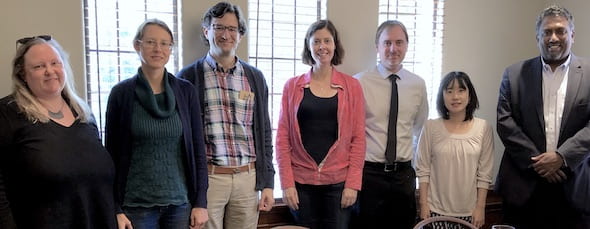
Rice’s Institute of Biosciences and Bioengineering announced this year’s Hamill Awards on Nov. 19. At the ceremony, from left, Jane Grande-Allen, Natasha Kirienko, IBB Faculty Director Zachary Ball, Christy Landes, Todd Treangen, Akane Sano and IBB Executive Director Paul Cherukuri. Photo by K. M’Carver
Institute awards $100,000 in prizes to Rice, Texas Medical Center faculty for high-risk research
Rice University’s Institute of Biosciences and Bioengineering (IBB) has honored four interdisciplinary teams of Rice and Texas Medical Center (TMC) faculty with $25,000 grants.
The annual awards, now in their 14th year, fund the initiation of collaborative bio-related research between science and engineering faculty, enabling the exploration of high-risk interdisciplinary projects. It also helps faculty members attain increasingly competitive grants and awards from federal agencies.
The IBB Hamill Innovation Awards were presented Nov. 19 at the Cohen House.
Collaborative research with the TMC ties in with the goals of Rice’s Vision for the Second Century, Second Decade.
This year’s honorees:
Akane Sano and Ashu Sabharwal of Rice and Nidal Moukaddam and Ramiro Salas of Baylor College of Medicine plan to detect “craving moments” with wearable devices that measure physiological and behavioral activity and prompt just-in-time substance abuse intervention. Sano is an assistant professor of electrical and computer engineering and Sabharwal is department chair and a professor of electrical and computer engineering at Rice. Moukaddam is an assistant of psychiatry and behavioral sciences and Salas an associate professor of psychiatry research at Baylor.
Natasha Kirienko and Jane Grande-Allen, both of Rice, will study the mechanisms behind pseudomonas aeruginosa, a multidrug-resistant pathogen that causes life-threatening bloodstream infections in immunocompromised patients, particularly those in intensive care units. They suspect the virulence factors of this bacterium play a critical but unrecognized role in cell damage during infection, inflammation and pathogen dissemination within the host. Kirienko is an assistant professor of biosciences and Grande-Allen is the Isabel C. Cameron Professor of Bioengineering and chair of the bioengineering department.
Christy Landes of Rice and Jonathan Kurie of the University of Texas MD Anderson Cancer Center will use super-resolution microscopy techniques developed in Landes’ lab to study the role of endocytic and secretory vesicular traffic in the epithelial-to-mesenchymal transition process suspected of driving cancer metastasis. They plan to develop computational analysis tools and construct a kinetic model of vesicle fusion events in cancer cells to better define the mechanism. Landes is a professor of chemistry, of electrical and computer engineering and of chemical and biomolecular engineering at Rice. Kurie is a professor of thoracic/head and neck medical oncology at MD Anderson.
Todd Treangen of Rice and Sonia Villapol of Houston Methodist Hospital plan to explore the connection between the brain and microbiome in response to concussions, based on their identification of a link between the two in experiments. They hope to determine whether detectable changes in the microbiome after a concussion can lead to novel therapies. Treangen is an assistant professor of computer science. Villapol is an assistant professor of neurosurgery at Methodist.

